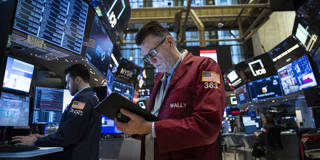Despite rosy forecasts, the US economy faces powerful headwinds that call into question its ability to serve as the world’s main growth driver. These challenges are compounded by domestic and geopolitical uncertainties that have not been reflected in market valuations and economic assessments.
CAMBRIDGE – What happens in the United States does not stay in the United States. The global economy depends on America to act as a main engine of growth, and global financial markets depend on US investors’ outsize appetite for risk. This became particularly evident in 2023 when major economies like Japan and the United Kingdom slipped into recession, Germany narrowly avoided one, and China grappled with obstacles to growth and pockets of high debt.
But whether the US economy can drive global growth in 2024 depends on the answers to three key questions. First, can the domestic economy maintain its current growth momentum and achieve the softest of soft landings? Second, can it remain resilient in the face of domestic political divisions and geopolitical uncertainties around the world? And lastly, will investors be able to secure sufficient liquidity to refinance debts accumulated during the era of artificially low interest rates and exceptionally high liquidity injections by central banks?
Based on current market prices, investors believe the answer to all three questions is a solid yes. Similarly, many economists are optimistic about the US economy, albeit with slightly less enthusiasm than that exhibited by capital markets.

CAMBRIDGE – What happens in the United States does not stay in the United States. The global economy depends on America to act as a main engine of growth, and global financial markets depend on US investors’ outsize appetite for risk. This became particularly evident in 2023 when major economies like Japan and the United Kingdom slipped into recession, Germany narrowly avoided one, and China grappled with obstacles to growth and pockets of high debt.
But whether the US economy can drive global growth in 2024 depends on the answers to three key questions. First, can the domestic economy maintain its current growth momentum and achieve the softest of soft landings? Second, can it remain resilient in the face of domestic political divisions and geopolitical uncertainties around the world? And lastly, will investors be able to secure sufficient liquidity to refinance debts accumulated during the era of artificially low interest rates and exceptionally high liquidity injections by central banks?
Based on current market prices, investors believe the answer to all three questions is a solid yes. Similarly, many economists are optimistic about the US economy, albeit with slightly less enthusiasm than that exhibited by capital markets.